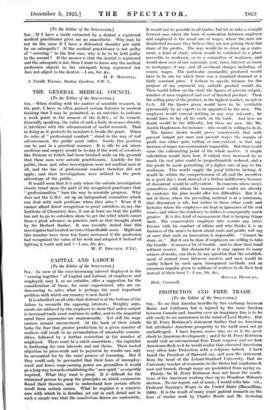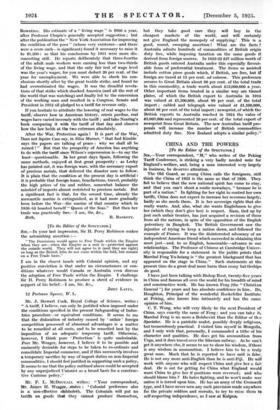PROTECTION AND FREE TRADE
[To the Editor of the SPECTATOR.] SIR,—TO see that America benefits by free exchange between Maine and California but is injured by the same freedom between Canada and America over an imaginary line is to be able easily to see narrowness in the mind of Lord Morley. But Sir H. Perry Robinson's statement further that no American but attributes American prosperity to the tariff must not go unchallenged. I have known scores who see in it the great check to American development ; and if Sir IL Perry Robinson would visit an international Free Trade congress and sec how Americans flock to it he would realize that educated Americans very often hate Protection with a religious hatred. I have heard the President of Harvard say, and seen the statement from the head of the Leland-Stanford University, that no University teacher of economics in the States but condemns it root and branch, though many are prohibited from saying so.
Plainly, Sir H. Perry Robinson does not know the condi- tions of the American working class up to Woodrow Wilson's election. To one report, out of many, I would refer him—viz., Professor Nearing's Wages in the United Slates (Maemillian, 1909). It is the result of many years' patient research on the lines of similar work by Charles Booth and Mr. Seebohm Rowntree. His estimate of a " living wage " is $900 a year, after Professor Chapin's generally accepted suggestion ; but after the publication the " New York Association for improving the condition of the poor " (whose very existence—and there were a score such—is significant) found it necessary to raise it to $1,200: so that his conclusions by, 1911 were more dis- concerting still. He reports deliberately that three-fourths of the adult male workers were earning less than two-thirds of the living wage, and that the only fair test of wage level was.the year's wages, for you must deduct 20 per cent. of the year for unemployment. We were able to check his con- clusions shortly after by the great textile strike, and found he had overestimated the wages. It was the dreadful revela- tions of that strike which shocked America (and all the rest of the world that was watching) and finally led to the conversion of the working man and resulted in a Congress, Senate and President in 1912 all pledged to a tariff for revenue only. .
If you hesitate to attribute the lowering of real wages to the tariff, observe how in American history, ceteris paribus, real
wages have varied inversely with the tariff ; andtake Nearing's book comparing it with the tariff of that day and observe how the law holds at the two extremes absolutely.
After the War, nvtection again ! It is part of the War.
Does not Squire Cass say, in Silas Marner, " that fool Kimble says the papers are talking of peace : why we shall all be ruined ! " But that the prosperity of America has anything to do with the tariff-since Wilson's supersession is—to say the least--questionable. In her great days Spain, following the same methods, enjoyeci at first great prosperity : as Lecky has pointed out, it was foreign wars, with the necessary export of precious metals, that deferred the disaster sure to follow.
It is plain that the condition at the present day is artificial : it is probable that foreign loans, benefactions, travel, probably the high prices of tin and rubber, somewhat balance the mischief of imports almost restricted to precious metals. But a significant fact is that, for the second time, already the mercantile marine is extinguished, as it had more gradually been before the War—the marine of that country which in 1850--GO boasted herself " Queen of the Seas." But then her trade was practically free.—I am, Sir, &e.,



































































 Previous page
Previous page